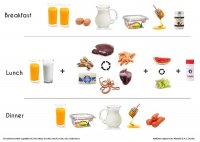Two Devided by Zero
Member
- Joined
- Oct 24, 2015
- Messages
- 14
This is my daily meal routine (see the pic), has been for over a year. Due to my latent OCD I'm probably a stricter peatard than most people here (no pufas, no starch, no veggies except carrot, only good fruits, low fait strictly organic dairy etc)...and it also means i quite enjoy it...the order, the discipline, the predictability. And after all whats not to like, life is prety sweet with so much glucose and fructose.
I'm 40, 6'7" (200cm), 207 pounds (93kilos). Fairly fit due to heavy weights twice a week, skinny most of my young life, with some pounds (and waist inches) added as i was nearing 40. Realized its no good, tried paleo for about a year, went back to ultra skinny, felt good, started with weights, but kept on reading and browsing, finally stumbling onto Peat. Added some weight back on, but nothing major, and now going slowly down again. And oh yeah, diagnosed with Hashimotos, though the tsi and hormone levels still fine, so not on thyroid yet.
Even though i work as a senior manager in a financial institution, working in the socialist continental europe translates into a fairly easy going laid back work life, with family life being just as great. So essentially no stress, at least not on any conscious level. What does concern me however is my night time cortisol. I pee at night, at least once, sometimes twice. And i always give it a full bladder, so this is not some prostate irritation or false alarms. If i understand it correctly, night cortisol converts muscle tissue into glucose, with water being a byproduct, thus explaning my genuinly full bladder. It also explains why i make wirtually zero progress on the muscle building front, in spite very heavy weights, iron discipline, and high protein (close to 200g, 300g on workout days) and carb intake. Which is driving me crazy, because i don't enjoy the gym, i suffer for the looks, which are then eaten away while i sleep by the g** d*** corisol.
I have searched here and found some tips, but i haven't been able to reference any of it to Peat, which i find strange given his focus on stress and hormones. And while i have a high respect for many prople in here, having lurked for years, i do think the forums are often victim to the 'purple monkey dishwasher' syndrome. Which isn't ideal, considering its human health we're dealing with here.
So, any ideas what Peat might suggest?
(K2, D, taurine, lysine..all daily, aspirin and E a couple of times per week, about two tsp of salt a day, absolutely no refined sugar, only juices, shitload of honey and fruit, occasional cinamon to help with protein amonia, etc.)...my daytime cortisol (not fasting one..that they don't check here) is very average.
I'm 40, 6'7" (200cm), 207 pounds (93kilos). Fairly fit due to heavy weights twice a week, skinny most of my young life, with some pounds (and waist inches) added as i was nearing 40. Realized its no good, tried paleo for about a year, went back to ultra skinny, felt good, started with weights, but kept on reading and browsing, finally stumbling onto Peat. Added some weight back on, but nothing major, and now going slowly down again. And oh yeah, diagnosed with Hashimotos, though the tsi and hormone levels still fine, so not on thyroid yet.
Even though i work as a senior manager in a financial institution, working in the socialist continental europe translates into a fairly easy going laid back work life, with family life being just as great. So essentially no stress, at least not on any conscious level. What does concern me however is my night time cortisol. I pee at night, at least once, sometimes twice. And i always give it a full bladder, so this is not some prostate irritation or false alarms. If i understand it correctly, night cortisol converts muscle tissue into glucose, with water being a byproduct, thus explaning my genuinly full bladder. It also explains why i make wirtually zero progress on the muscle building front, in spite very heavy weights, iron discipline, and high protein (close to 200g, 300g on workout days) and carb intake. Which is driving me crazy, because i don't enjoy the gym, i suffer for the looks, which are then eaten away while i sleep by the g** d*** corisol.
I have searched here and found some tips, but i haven't been able to reference any of it to Peat, which i find strange given his focus on stress and hormones. And while i have a high respect for many prople in here, having lurked for years, i do think the forums are often victim to the 'purple monkey dishwasher' syndrome. Which isn't ideal, considering its human health we're dealing with here.
So, any ideas what Peat might suggest?
(K2, D, taurine, lysine..all daily, aspirin and E a couple of times per week, about two tsp of salt a day, absolutely no refined sugar, only juices, shitload of honey and fruit, occasional cinamon to help with protein amonia, etc.)...my daytime cortisol (not fasting one..that they don't check here) is very average.
Attachments
Last edited by a moderator:

